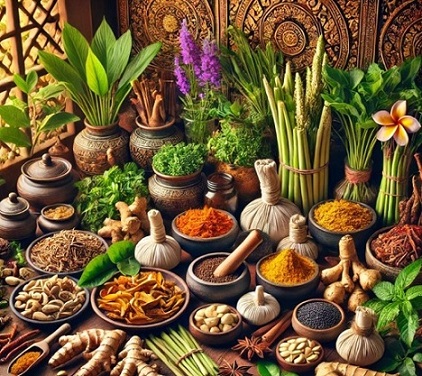Thailand medical study validates anti-inflammatory claims of Yataprasen, a Thai traditional herbal medicine
Nikhil Prasad Fact checked by:Thailand Medical News Team Aug 03, 2024 1 year, 5 months, 2 weeks, 10 hours, 11 minutes ago
Thailand Medical: Osteoarthritis, a common and debilitating condition affecting millions worldwide, often leads to significant pain, inflammation, and reduced mobility. While conventional treatments such as non-steroidal anti-inflammatory drugs (NSAIDs) are available, they come with a host of side effects. This
Thailand Medical news report explores a fascinating study on the traditional Thai medicine formulary known as Yataprasen (YTPS) and its potential as an effective and safer alternative for managing osteoarthritis and other inflammatory conditions.
 Thailand medical study validates anti-inflammatory claims of Yataprasen,
Thailand medical study validates anti-inflammatory claims of Yataprasen,
a Thai traditional herbal medicine
What is Yataprasen?
Yataprasen is a traditional Thai medicinal remedy comprising 13 herbal ingredients. It has been widely used in Thai traditional medicine to alleviate musculoskeletal pain, osteoarthritis, and joint discomfort. The remedy is traditionally applied topically and involves a unique blend of herbal extracts known for their medicinal properties.
Herbal Ingredients of Yataprasen
The 13 herbs in Yataprasen include:
Putranjiva roxburghii (Leaves, 37%)
Senna siamea (Leaves, 9%)
Bridelia solanifolium (Leaves, 9%)
Cymbopogon nardus (Rhizomes and leaves, 9%)
Tamarindus indica (Leaves, 9%)
Melia azedarach (Leaves, 9%)
Boesenbergia rotunda (Rhizomes and roots, 2%)
Allium sativum (Bulbs, 2%)
Alpinia galanga (Rhizomes, 2%)
Piper nigrum (Fruits, 2%)
Ferula assa-foetida (Resin from roots, 2%)
Aloe vera (Resin, 2%)
Allium ascalonicum (Bulbs, 2%).
Main Phytochemicals in Yataprasen
The primary active compounds in Yataprasen are β-amyrin and stigmasterol. These compounds are derived mainly from Putranjiva roxburghii, which makes up a significant portion of the formulation.
-β-Amyrin: A pentacyclic triterpenoid found in several plants, including Alstonia boonei and Protium heptaphyllum, known for its anti-inflammatory activity. It inhibits COX, LOX, and NOS enzymes and reduces PGE2 and IL-6 secretion.
-Stigmasterol: A tetracyclic triterpene found in plants such as Hygrophila schulli and Wrightia tinctoria. It exhibits anti-osteoarthritis and anti-inflammatory properties by inhibiting IL-1β, IL-6, TNF-α, NO, and COX-2 production.
Yataprasen contains 70.30 nM of β-amyrin and 605.76 nM of stigmasterol, primarily derived from Putranjiva roxburghii. Both compounds are known for their anti-inflammatory effects, crucial to YTPS's effectiveness.
Study Overview
Researchers from Chiang Mai University-Thailand, Srinakharinwirot Uni
versity-Thailand and the University of East Anglia-UK investigated the anti-inflammatory and antioxidant properties of Yataprasen. This study primarily delved into the bioactive compounds β-amyrin and stigmasterol found in YTPS and their effects on inflammation and oxidative stress.
Key Findings
-Antioxidant Properties
The researchers found that YTPS has significant antioxidant properties. Using ABTS and DPPH assays, they determined that YTPS exhibits free radical scavenging activity. This suggests that the remedy can effectively neutralize harmful free radicals, which are often linked to inflammation and various chronic diseases.
-Anti-Inflammatory Effects
The anti-inflammatory properties of YTPS were evaluated using RAW264.7 and THP-1 cell lines. These cells were treated with different concentrations of YTPS extract, β-amyrin, and stigmasterol. The study revealed that YTPS significantly reduces the production of inflammatory cytokines such as IL-1β, IL-6, and TNF-α. These cytokines are crucial mediators of inflammation and pain in osteoarthritis.
-Impact on Nitric Oxide Production
One of the notable findings of the study is the impact of YTPS on nitric oxide (NO) production. NO is a key player in the inflammatory process. The YTPS extract was found to markedly lower NO levels in a dose-dependent manner, which is indicative of its strong anti-inflammatory potential.
Detailed Analysis
Composition and Dosage
The YTPS extract contains 70.30 nM of β-amyrin and 605.76 nM of stigmasterol. These compounds are primarily derived from Putranjiva roxburghii, one of the main components of the YTPS formulary. Both β-amyrin and stigmasterol are known for their anti-inflammatory effects, making them critical to the effectiveness of YTPS.
Cellular Studies
The study employed several cellular assays to measure the effects of YTPS. For instance, the MTT assay was used to determine the cytotoxicity of the YTPS extract on RAW264.7 cells. The results showed that YTPS is non-toxic at the tested concentrations, further supporting its potential as a safe therapeutic agent.
Inflammatory Mediator Inhibition
The researchers also used ELISA to measure the levels of inflammatory cytokines in THP-1 cells. They found that YTPS and its components significantly inhibit the secretion of IL-1β, IL-6, and TNF-α in LPS-stimulated cells. This inhibition is crucial for reducing inflammation and the associated pain.
Safety Evaluation
-Skin Safety
Since YTPS is applied topically, its safety on the skin was evaluated using HaCaT cells, a human keratinocyte cell line. The study confirmed that YTPS is non-toxic to these cells, indicating its safety for topical use.
-Kidney Safety
Given the potential nephrotoxicity of NSAIDs, the study also assessed the effects of YTPS on HEK293 cells, a human kidney cell line. The results showed no significant toxicity, suggesting that YTPS is safe for kidney function.
Conclusion
The findings from this study are promising and suggest that Yataprasen, a traditional Thai herbal medicine, has significant anti-inflammatory and antioxidant properties. These properties make it a potential alternative for managing osteoarthritis and other inflammatory conditions with fewer side effects compared to conventional NSAIDs.
The study findings were published in the peer-reviewed journal Pharmaceuticals.
https://www.mdpi.com/1424-8247/17/8/1018
For the latest on Thai traditional herbal medicine, keep on logging to
Thailand Medical News.
Read Also:
https://www.thailandmedical.news/news/ten-health-benefits-of-the-moringa-leaf-
https://www.thailandmedical.news/news/medical-benefits-of-kwao-krua-pueraria-mirifica-for-women
